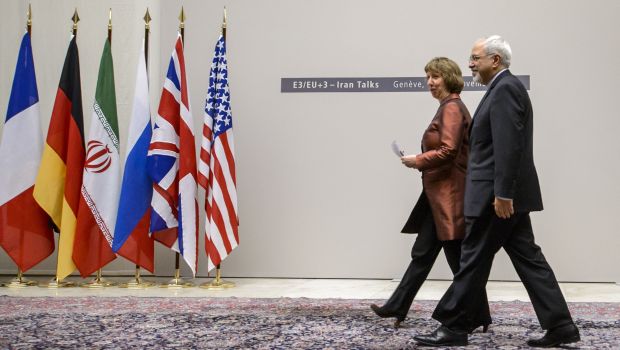
EU Foreign Policy Chief Catherine Ashton, left, and Iranian Foreign Minister Mohammad Javad Zarif arrive for a statement on early November 24, 2013 in Geneva. (AFP Photo/Fabrice Coffrini)
London, Asharq Al-Awsat—Iran’s foreign ministry confirmed on Monday it is continuing to speak with US and EU officials, despite fears that Washington’s decision last week to impose new sanctions on 19 Iranian individuals and firms had derailed ongoing international negotiations over its controversial nuclear program.
The statement comes a day after the publication of an interview with Iranian Foreign Minister Mohammad Javad Zarif in the Washington Post, in which he said that Iran was “100 percent” committed to reaching a comprehensive final agreement, despite hitting a “snag” in nuclear negotiations last week.
Zarif added that he had communicated with US Secretary of State John Kerry, EU Foreign Policy Chief Catherine Ashton, and Russian Foreign Minister Sergey Lavrov “in order to make sure that everybody is committed to Geneva.”
“What I have heard from Secretary Kerry and Lady Ashton is that they are committed to an early finalization of the Geneva process with a view to reaching a comprehensive agreement. I share that objective,” Zarif said during the interview.
Zarif was referring to the interim nuclear agreement reached by Iran and the P5+1, the permanent members of the UN Security Council plus Germany, in the Swiss city on November 24. In that deal, Iran agreed to limit some aspects of its nuclear program in return for limited sanctions relief, and a promise from the US and its allies not to impose new sanctions for six months.
Senior US officials have argued, however, that last week’s sanctions were carried out within the framework of the existing sanctions regime and therefore did not constitute “new” measures.
The US accused the sanctioned 19 individuals and firms of supplying equipment to Iran for its nuclear and ballistic missile development programs.
Zarif, Iran’s chief negotiator, said that his country would continue the talks, despite the “extremely counterproductive” decision by the US.
He also complained that he had not been given advance notice by the US regarding the US Treasury Department’s new actions.
In a statement issued on Monday, the Iranian foreign ministry confirmed that Zarif had spoken by telephone to Kerry, and had expressed “displeasure” at the extension of the blacklist.
However, Zarif said on Sunday that Iran’s unhappiness would cause the government to walk away from the talks.
“The process has been derailed,” he said. “The process has not died. We are trying to put it back and to correct the path and continue the negotiations because I believe there is a lot at stake for everybody.”
Meanwhile, Iranian foreign ministry officials have continued meetings with their European counterparts in order to continue negotiations over a nuclear deal.
Iranian Deputy Foreign Minister Abbas Araqchi is scheduled to arrive in Germany on Monday for consultation with his German counterpart, at the invitation of the country’s foreign ministry.
After Germany, Araqchi is to fly to Brussels for a meeting with Ashton on Tuesday.
Ashton told reporters on Monday that the talks with Iran on the nuclear issue would resume.
“We have sorted out most of the details but there are one or two areas where we need to think very carefully about how the implementation is going to work,” she said. “The Iranian team went back for some consultation [from Vienna], but I have been in touch with the foreign minister and I am expecting them to start work again very soon.”
